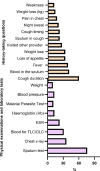Are informal healthcare providers knowledgeable in tuberculosis care? A cross-sectional survey using vignettes in West Bengal, India
- PMID: 35907263
- PMCID: PMC10318973
- DOI: 10.1093/inthealth/ihac051
Are informal healthcare providers knowledgeable in tuberculosis care? A cross-sectional survey using vignettes in West Bengal, India
Abstract
Background: India accounts for one-quarter of the world's TB cases. Despite efforts to engage the private sector in India's National TB Elimination Program, informal healthcare providers (IPs), who serve as the first contact for a significant TB patients, remain grossly underutilised. However, considering the substantial evidence establishing IPs' role in patients' care pathway, it is essential to expand the evidence base regarding their knowledge in TB care.
Methods: We conducted a cross-sectional study in the Birbhum district of West Bengal, India. The data were collected using the TB vignette among 331 IPs (165 trained and 166 untrained). The correct case management was defined following India's Technical and Operational Guidelines for TB Control.
Results: Overall, IPs demonstrated a suboptimal level of knowledge in TB care. IPs exhibited the lowest knowledge in asking essential history questions (all four: 5.4% and at least two: 21.7%) compared with ordering sputum test (76.1%), making a correct diagnosis (83.3%) and appropriate referrals (100%). Nonetheless, a statistically significant difference in knowledge (in most domains of TB care) was observed between trained and untrained IPs.
Conclusions: This study identifies gaps in IPs' knowledge in TB care. However, the observed significant difference between the trained and untrained groups indicates a positive impact of training in improving IPs' knowledge in TB care.
Keywords: India; informal healthcare providers; quality of care; tuberculosis; tuberculosis care; vignettes.
© The Author(s) 2022. Published by Oxford University Press on behalf of Royal Society of Tropical Medicine and Hygiene.
Conflict of interest statement
None declared.
Figures
Similar articles
-
Barriers and facilitators to informal healthcare provider engagement in the national tuberculosis elimination program of India: An exploratory study from West Bengal.PLOS Glob Public Health. 2023 Oct 4;3(10):e0001390. doi: 10.1371/journal.pgph.0001390. eCollection 2023. PLOS Glob Public Health. 2023. PMID: 37792715 Free PMC article.
-
What are the tuberculosis care practices of informal healthcare providers? A cross-sectional study from Eastern India.Health Policy Plan. 2022 Oct 12;37(9):1158-1166. doi: 10.1093/heapol/czac062. Health Policy Plan. 2022. PMID: 35920775
-
Variations in the quality of tuberculosis care in urban India: A cross-sectional, standardized patient study in two cities.PLoS Med. 2018 Sep 25;15(9):e1002653. doi: 10.1371/journal.pmed.1002653. eCollection 2018 Sep. PLoS Med. 2018. PMID: 30252849 Free PMC article.
-
Role of informal healthcare providers in tuberculosis care in low- and middle-income countries: A systematic scoping review.PLoS One. 2021 Sep 2;16(9):e0256795. doi: 10.1371/journal.pone.0256795. eCollection 2021. PLoS One. 2021. PMID: 34473752 Free PMC article.
-
TB operational research in India - Gaps and pragmatic solutions.Indian J Tuberc. 2024 Jan;71(1):3-6. doi: 10.1016/j.ijtb.2023.10.006. Epub 2023 Nov 8. Indian J Tuberc. 2024. PMID: 38296387 Review.
Cited by
-
Barriers and facilitators to informal healthcare provider engagement in the national tuberculosis elimination program of India: An exploratory study from West Bengal.PLOS Glob Public Health. 2023 Oct 4;3(10):e0001390. doi: 10.1371/journal.pgph.0001390. eCollection 2023. PLOS Glob Public Health. 2023. PMID: 37792715 Free PMC article.
-
Exploring factors influencing the compliance of patients and family carers with infection prevention and control recommendations across Bangladesh, Indonesia, and South Korea.Front Public Health. 2022 Dec 22;10:1056610. doi: 10.3389/fpubh.2022.1056610. eCollection 2022. Front Public Health. 2022. PMID: 36620289 Free PMC article.
-
Engaging the Private Health Service Delivery Sector for TB Care in India-Miles to Go!Trop Med Infect Dis. 2023 May 4;8(5):265. doi: 10.3390/tropicalmed8050265. Trop Med Infect Dis. 2023. PMID: 37235313 Free PMC article. Review.
-
Institutionalizing linkages between informal healthcare providers and the formal health system in Nigeria: what are the facilitating and constraining contextual influences?Health Policy Plan. 2025 Apr 9;40(4):471-482. doi: 10.1093/heapol/czaf009. Health Policy Plan. 2025. PMID: 39913199 Free PMC article.
-
Unlocking the potential of informal healthcare providers in tuberculosis care: insights from India.BMJ Glob Health. 2024 Feb 26;9(2):e015212. doi: 10.1136/bmjgh-2024-015212. BMJ Glob Health. 2024. PMID: 38413099 Free PMC article. No abstract available.
References
-
- World Health Organization. Global Tuberculosis Report 2021. Available at https://www.who.int/publications/i/item/9789240037021 [accessed January 15, 2022].
-
- World Health Organization . Public-Private Mix for TB Prevention and Care: a Roadmap. Available at https://www.who.int/publications/i/item/WHO-CDS-TB-2018.32 [accessed December 19, 2021].
-
- Mackintosh M, Channon A, Karan Aet al. . What is the private sector? Understanding private provision in the health systems of low-income and middle-income countries. Lancet. 2016;388(10044):596–605. - PubMed
-
- Reid MJ, Arinaminpathy N, Bloom Aet al. . Building a tuberculosis-free world: the Lancet Commission on tuberculosis. Lancet. 2019;393(10178):1331–84. - PubMed
MeSH terms
LinkOut - more resources
Full Text Sources
Medical


